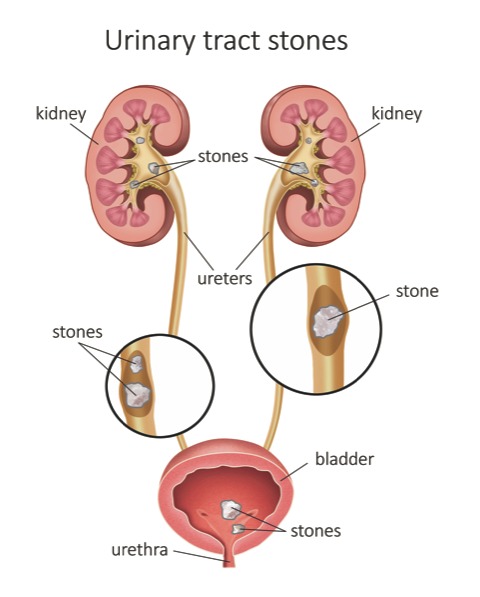Bladder stones are caused by a build-up of minerals in the bladder. They occur when the bladder does not empty completely after urination and the remaining urine becomes concentrated; this creates an environment for the minerals in the fluid to become crystals.
Sometimes these bladder stones can be expelled spontaneously while they are still very small. Other times, the stones remain in the lower bladder, without symptoms, and gradually build up into a larger stone over time.
Bladder stones can therefore remain in the bladder for some time and do not always cause symptoms. They may even be found incidentally during an X-ray examination. Some stones are almost spherical, while others may be irregularly shaped. In addition, they can measure from a few millimeters to several centimeters.
This condition is more common in men over 50.


What are the symptoms of bladder stones?
- Discomfort or pain in the penis.
- Hesitation to start urinating.
- Pain in the suprapubic area.
- Pain and discomfort during urination.
- Blood in the urine (hematuria).
- Cloudy urine.
What are the associated conditions for developing bladder stones?
- Neurogenic bladder.
- Complication of benign prostatic hypertrophy.
- Indwelling urinary catheter.
- Chronic urinary bladder infection.
- Diverticulum of the bladder.
- Cystocele: rather rare in women.
What are the possible complications of bladder stones?
- Bladder dysfunction: frequent, painful and uncomfortable urination. Sometimes bladder stones can even create an obstruction.
- Repeated infections of the urinary tract.
What are the tests to diagnose bladder stones?
- Urinalysis: presence of microscopic hematuria.
- Computed tomography.
- Pelvic ultrasound.
- Plain X-ray of the abdomen.
- Cystoscopy
What are the treatments for bladder stones?
How can I prevent bladder stones?
Quick exams at the Marois Clinics
- Cystoscopy
- Ultrasound of the bladder and prostate


